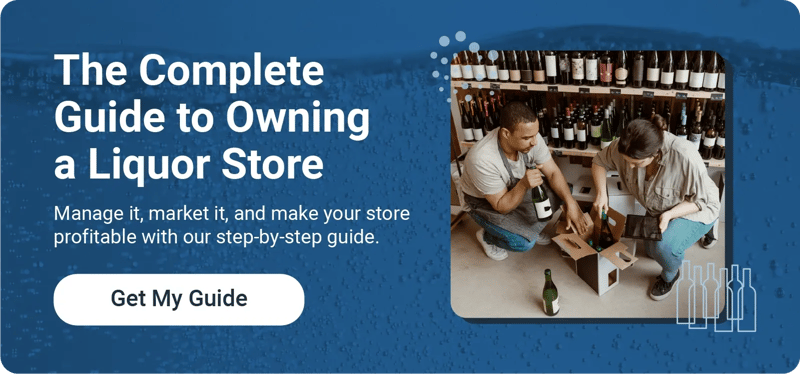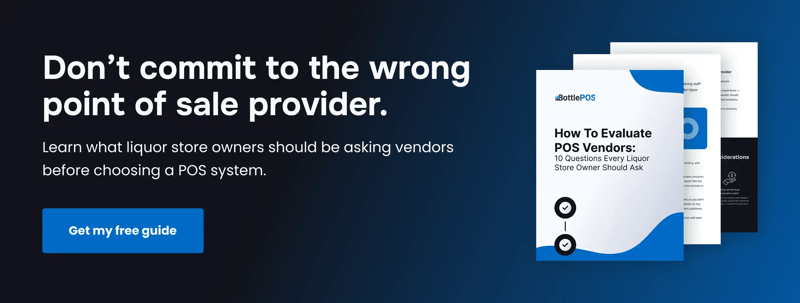Every state’s liquor laws are unique (and often complicated), and that’s no different for Florida.
Alcohol sales in Florida are on the rise, and that trend doesn’t look to be slowing down — learning to navigate these laws is your first step to finding success as the owner of a package store, wine shop, or beer shop.
While using a liquor store system that’s built for compliance is a good start, having some basic knowledge of Florida liquor laws is key if you sell (or plan to sell) alcohol in the Sunshine State.
If you sell (or plan to sell) alcohol in the Sunshine State, knowing these six Florida liquor laws is essential.
1. There Are Multiple Types of Liquor Retail Licenses
Like many states, Florida has different liquor licenses depending on whether customers consume alcohol on or off-premises. Most liquor stores will need an off-premises license to operate legally.
There are also different types of licenses based on what you sell (e.g., beer and wine, liquor, or just beer).
However, unlike many states, if you plan to sell beer, wine, and liquor, you must apply for a quota license. Florida offers only a limited number of active liquor licenses. The number of available licenses is based on the population in a given county.
Quota licenses are awarded through a lottery run once a year. If you plan only to sell beer or wine, there is no limit to the number of licenses.
While you wait for your license approval, you can apply for a temporary license to sell alcohol.

2. You Must Be 18 or Older To Serve Beer and Wine
Florida prohibits anyone under the age of 18 from selling alcohol. If you operate a bar or other on-premises location, an 18-year-old can serve alcohol but cannot pour it.
Additionally, you must be 21 or older to transport alcohol. If you’re caught transporting alcohol as a minor, it doesn’t matter whether the container is open or not.
For liquor store owners, this means knowing exactly how old your employees are and what tasks you assign them.
To increase compliance in this area, ensure your liquor store software has employee access controls. These tools limit which functions different employees have access to.
3. Alcohol Sales Might Be Banned Ahead of a Hurricane
A lesser-known Florida statute allows local governments to ban alcohol sales before a hurricane. This statute also allows local officials to enact curfews and other emergency measures.
So, if extreme weather is on the horizon, it might be wise to prepare to close your store. Or, at the very least, listen out for announcements.
You can also use the marketing tools on your point of sale (POS) system to send out alerts to customers via SMS, pre-warning them of any changes to your opening times.
4. There Are Steep Penalties for Serving Minors
As someone who sells alcohol, it’s your responsibility to prevent underage alcohol sales. Whether it’s an accident or not, selling alcohol to a minor can result in a $500 fine or even jail time — and that’s just for a first offense.
Additional and harsher penalties apply if the minor is your employee and drinks on the job. This is considered a first-degree misdemeanor, and it can result in a fine of $1000 and up to a year in jail.
Long story short, don’t take shortcuts when it comes to age verification.
If you are checking IDs by hand, your risk increases exponentially. To ensure you stay legally compliant, use a liquor store POS system that supports ID scanners. ID scanners speed up the checkout process by allowing you to quickly store and validate the information on a customer ID.

5. Know What Types of IDs Are Accepted (and What To Do With Fake IDs)
It should be obvious how important it is to check ID at your package store, but what types of ID are allowed in Florida? According to Florida law, the following are all acceptable forms of ID for alcohol sales:
- Valid drivers license
- Passport
- State-issued ID card
- Military ID
What should you do if you spot a fake ID? In Florida, a business is not allowed to confiscate a fake ID. Instead, refuse the sale and contact the authorities.
This is another instance where modern age verification tools like ID scanners can save the day.
Related Read: REVEALED: The 4 Most Important Liquor POS Security Features
6. Online Sales Are Legal
Online sales and delivery of alcohol are legal in Florida. That’s great news since many Americans are interested in online liquor sales!
There are no restrictions on what you can sell for off-premises delivery, but you must have a valid liquor license and verify the age of customers on your website.
Selling alcohol online can come with more risks since you won’t be able to check customers’ age as easily. Alcohol is also considered a “high-risk “business, which requires a high-risk payment processor (that not all e-commerce platforms support).
That’s why it’s important to use an e-commerce solution specifically designed for alcohol sales. It will help keep you in compliance with Florida liquor laws and simplify your online sales by connecting your online and in-store inventory.
Simplify Selling Alcohol in Florida With a System Built for Liquor Stores
Staying up to date on Florida liquor laws is essential if you own a package store in the Sunshine State — and using an industry-specific POS system makes it easier than ever.
Bottle POS was built by liquor store owners for liquor store owners and comes with legally compliant tools built in. Bottle POS doesn’t just make following the law a breeze; it simplifies every aspect of running a liquor store — from advanced inventory management and automated purchase orders to auto ranking and customer loyalty.
Explore Bottle POS today to learn how our liquor store system can boost your sales, keep you compliant with Florida law, and crush the competition in 2026.
